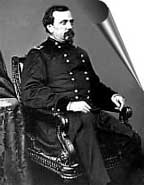 You may have heard that Scooter is the first White House official to have been indicted since the Grant Administration. Just for fun, let’s take a look at that last indictee, Orville Babcock.
You may have heard that Scooter is the first White House official to have been indicted since the Grant Administration. Just for fun, let’s take a look at that last indictee, Orville Babcock.
Background: Babcock was a native of Vermont who graduated West Point in 1861, just in time for the Civil War. By 1863 he was a Lieutenant Colonel under the command of Maj. Gen. Ulysses S. Grant at Vicksburg. In 1864, Babcock became Grant’s aide-de-camp. It was Babcock who delivered Grant’s surrender terms to Robert E. Lee at Appomattox. When Grant became President in 1869 he chose Babcock to be his private secretary.
The Whiskey Ring was a group of liquor distillers who were defrauding the government of tax revenues, in part by bribing revenue agents to ignore untaxed liquor or to supply more tax stamps than were paid for. Grant’s secretary of the treasury, Benjamin Bristow, investigated and obtained indictments against 238 people, including Orville Babcock. Of those, 110 were convicted.
From Grant by Jean Edward Smith (Simon & Schuster, 2001), pp. 590-591:
Grant was initially alerted to Babcock’s possible complicity in July 1875 when he received a letter from St. Louis banker W.D.W. Barnard, a distant relative of Julia’s [Mrs. Grant]. Barnard warned Grant that federal prosecutors in St. Louis were hoping to embarrass the administration and that Babcock had become a target. Grant was shocked that his aide might be involved. He immediately passed the letter to Bristow with the following endorsement: “I forward this for information and to the end that if it throws any light upon new parties to summon as witnesses they may be brought out. Let no guilty man escape if it can be avoided. Be especially vigilant—or instruct those engaged in the prosecution of fraud to be—against all who insinuate that they have high influence to protect—or to protect them. No personal consideration should stand in the way of performing a public duty.†Shortly thereafter Grant told Attorney General Pierrepont that “if Babcock is guilty, there is no man who wants him so proven guilty as I do, for it is the greatest piece of traitorism to me that a man could possibly practice.â€
As it turned out, the evidence against Babcock was circumstantial. The prosecution’s case rested on Babcock’s friendship with McDonald[*], his occasional visits to St. Louis, and two cryptic telegrams the president’s secretary sent to the general. Bristow believed the messages were code to inform the St. Louis ring of the status of the Treasury crackdown. The first, dated December 10, 1874, stated—“I have succeeded. They will not go. I will write you.†It was signed “Sylph.†The second, sent on February 3, 1875, read: “We have official information that the enemy weakens. Push things. Sylph.â€
Babcock maintained the messages were for Eads[**] and described the status of the Corps of Engineers’ efforts to scuttle the bridge in St. Louis. At the time, Grant trusted General McDonald fully, and it is quite possible the president was using him to funnel information to Eads. When Grant heard Babcock’s explanation, he was satisfied the telegrams were harmless.
A second difficulty for the prosecution was Babcock’s lifestyle. Unlike former Attorney General Williams, the president’s secretary lived modestly within his income. He was not a free-spender, his bank account showed no questionable deposits, and his wife was known for her frugality. His one hobby was raising fine dahlias, which he would share with his neighbors, including the Frederick Douglasses.
In December 1875 Babcock requested a miitary board of inquiry to clear his name, but the prosecutors in St. Louis refused to release files and the board was adjourned. Shortly thereafter a grand jury in St. Louis indicted Babcock “for conspiring to defraud the revenue.” President Grant volunteered his testimony and gave a four-hour deposition to the Chief Justice of the Supreme Court, in the presence of the Attorney General and the Treasury Secretary, Bristow.
Jean Edward Smith continues on page 592 of Grant:
Grant’s testimony silenced all but the most rancorous critics of the administration. The unprecedented spectacle of the president of the United States coming forward voluntarily to defend his secretary, combined with Grant’s unblemished reputation for personal honesty, had an enormous impact. [Secretary of State] Hamilton Fish, one of the most honest men in public life, once said, “I do not think it would have been possible for Grant to have told a lie, even if he had composed it and written it down.” The prosecution continued to present what little evidence it had against Babcock, but it was unconvincing and the general[***] was speedily acquitted.
Orville Babcock died in a boat accident in 1884 and is buried at Arlington National Cemetary.
*General John McDonald was collector of taxes in St. Louis and was one of the 110 convicted.
**James Buchanan Eads was an engineer-industrialist and an old friend of Grant’s who was determined to build a bridge across the Mississippi. The Corps of Engineers had halted construction. The Eads Bridge eventually was built and is still in use.
***Babcock held the brevet rank of Brigadier General.
